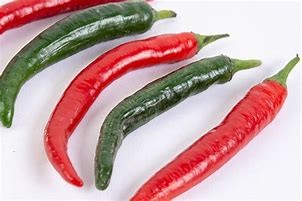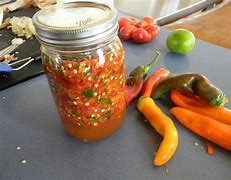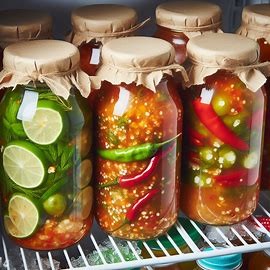Are you a hot sauce enthusiast looking to elevate your culinary creations? If so, you’ll be delighted to learn about the wonders of fermented hot sauce.
In this comprehensive guide, we’ll delve into the world of fermented hot sauce, covering everything from its ingredients and preparation to its health benefits and storage. By the end of this article, you’ll be equipped with the knowledge to craft your own flavorful fermented hot sauce at home, and you’ll even discover some tantalizing recipes to put it to use.
So, get ready to spice up your culinary adventures as we explore the fascinating realm of fermented hot sauce.
What is Fermented Hot Sauce?
Fermented hot sauce is a DIY homemade condiment that offers a unique and pungent flavor through the fermentation process.
The homemade nature of fermented hot sauce adds an element of creativity and personalization to the condiment. The fermentation process involves allowing the natural bacteria and yeast present in the ingredients to break down sugars and develop complex flavors, resulting in a rich, tangy taste.
The pungent flavor of the hot sauce intensifies over time as it ferments, creating a depth of flavor that sets it apart from other types of hot sauce. This unique process gives fermented hot sauce its distinctive and deliciously intense flavor profile.
What Are the Ingredients for Fermented Hot Sauce?

The ingredients for fermented hot sauce typically include peppers, spices, vinegar, and other optional components, forming the core of the recipe and fermentation process.
Peppers, especially varieties like jalapeno, habanero, or serrano, provide the base flavor and heat for the hot sauce. Spices such as garlic, onions, or cumin can enhance the complexity of the sauce.
Vinegar acts as a preservative and also adds tanginess. The fermentation process involves allowing the mixture to sit at room temperature for several days, allowing the natural bacteria and yeasts present on the peppers to ferment the sauce. This process not only enhances the flavor but also increases the sauce’s shelf life.
Hot Peppers
Hot peppers are the key ingredient for fermenting homemade hot sauce, imparting spicy flavors and serving as the foundation for the recipe for fermented hot sauce.
Their significance lies in their ability to infuse the hot sauce with bold and complex flavors, thanks to the compound called capsaicin, which gives hot peppers their characteristic heat. During the fermentation process, the natural sugars in the peppers are broken down by beneficial bacteria, resulting in a tangy and robust flavor profile.
Heat level can also be adjusted by the choice of hot peppers, offering a versatile range of spiciness for hot sauce enthusiasts. Ultimately, hot peppers play a crucial role in elevating the taste and complexity of homemade fermented hot sauce.
Salt
Salt plays a crucial role in the fermentation and preservation of the hot sauce during the fermentation process, adding depth to the overall flavor profile as per the fermentation recipe.
It acts as a natural preservative, inhibiting the growth of harmful bacteria while allowing beneficial lactic acid bacteria to thrive. The salt also draws out moisture from the peppers, creating the ideal environment for fermentation.
This process not only extends the shelf life of the hot sauce but also enhances its complex and well-rounded taste, providing a perfect balance of flavors and a unique tang that is characteristic of fermented hot sauces.
Water
Water is an essential component in the fermentation process and crucial for the DIY creation of fermented hot sauce, aiding in the development of the desired flavors and textures.
It serves as the medium through which beneficial bacteria and yeasts thrive, converting the sugars and starches in the ingredients into flavorful compounds that give the hot sauce its distinct, tangy and complex taste. Water helps regulate the level of moisture in the fermenting mixture, ensuring the ideal environment for the fermentation to take place.
It plays a role in controlling the texture of the hot sauce, contributing to its smoothness and overall mouthfeel. Thus, the quality of the water used can significantly impact the final taste and texture of the fermented hot sauce.
Optional Ingredients
In addition to the core ingredients, optional components such as garlic, fruits, or other spices can be added to create a custom and homemade spice mix for the fermented hot sauce.
These optional ingredients offer a wide range of possibilities to tailor the hot sauce to personal preferences. For instance, adding roasted red peppers can infuse a smoky flavor, while incorporating mangoes or pineapples can add a sweet and tangy twist.
Experimenting with different herbs, like cilantro or basil, can also elevate the complexity of flavor. Varying the quantities of these optional ingredients allows for endless variations, ensuring that each batch of homemade fermented hot sauce is unique and tailored to individual taste buds.
How Do You Make Fermented Hot Sauce?

Making fermented hot sauce involves an easily manageable fermentation process, incorporating heat and a bottling stage to create a homemade hot sauce with distinctive flavors.
During the fermentation process, the natural sugars in the hot peppers and other ingredients are converted into lactic acid by the beneficial bacteria present. This enhances the depth of flavor and also acts as a natural preservative. The heat requirement is crucial to kickstarting the fermentation process and ensuring the growth of the right bacteria.
After the fermentation, the hot sauce is carefully bottled, allowing the flavors to mature further. The end result is a tangy, complex hot sauce with a kick of heat and a depth of flavor that’s hard to find in store-bought varieties.
Prepare The Peppers
The initial step in making fermented hot sauce is to prepare the peppers for the fermentation process, ensuring their quality and readiness for the pepper fermentation stage.
This process is crucial as it sets the foundation for developing the unique flavors and complexity that define fermented hot sauce. Properly preparing the peppers involves:
- Washing them thoroughly
- Removing any blemishes
- Cutting them into uniform pieces
This pre-fermentation step not only ensures cleanliness but also helps to kick-start the fermentation process by breaking down the cell walls and releasing the natural sugars and flavors present in the peppers. It promotes the growth of beneficial bacteria that are essential for the fermentation of peppers, ultimately influencing the character and tang of the resulting hot sauce.
Mix The Peppers, Salt, And Water
The next stage involves mixing the prepared peppers with salt and water, initiating the fermenting process that shapes the flavor profile of the hot sauce during this crucial stage of the process.
As the peppers, salt, and water combine, natural fermentation begins, allowing the beneficial bacteria to thrive and develop complex flavors. The salt acts as a preservative, regulating the fermentation process, while the water creates the ideal environment for the microorganisms to flourish.
The flavors intensify and deepen over time as the mixture ferments, creating a unique and rich hot sauce with layers of complex flavors and a delightful kick of heat. This transformative stage is essential to yielding a well-balanced and flavorful hot sauce.
Ferment The Mixture
Allowing the mixture to ferment is a key step, leading to the development of probiotic qualities and contributing to the unique character of the fermented hot sauce as per the fermentation recipe.
During the fermentation stage, beneficial bacteria begin to break down the sugars and other compounds in the ingredients, creating a tangy and slightly sour taste. This process also enhances the shelf life of the hot sauce and promotes the growth of good bacteria and enzymes, which are essential for gut health.
The fermentation also deepens the complexity of flavors, adding depth and richness to the sauce, making it distinct from non-fermented varieties. This transformation is what gives fermented hot sauce its signature tang and depth of flavor.
Blend And Strain The Sauce
Blending and straining the fermented mixture results in the desired texture and taste, further enhancing the health benefits and overall appeal of the fermented hot sauce.
This meticulous process ensures that the flavors are harmoniously combined, producing a well-balanced hot sauce with a smooth, velvety texture. By removing any remaining solids or impurities, the resulting sauce attains a refined quality, enriching its overall aroma and flavor profile. The straining process also contributes to the longevity of the hot sauce, enhancing its shelf life without compromising its innate nutritional value.
This attention to detail reinforces the appeal of the fermented hot sauce, elevating its standing as a staple condiment in culinary practices.
What Are the Health Benefits of Fermented Hot Sauce?
Fermented hot sauce offers various health benefits, including probiotic properties that support digestion, making it more than just a spicy condiment.
The probiotics in fermented hot sauce can help maintain a healthy balance of gut bacteria, which is beneficial for overall digestive health.
The fermentation process can enhance the bioavailability of nutrients and the concentration of beneficial compounds, potentially contributing to improved nutrient absorption. The capsaicin found in spicy hot sauces has been linked to potential metabolism-boosting effects and pain relief. Thus, incorporating fermented hot sauce into your diet may offer a range of wellness benefits beyond its flavorful spiciness.
Contains Probiotics
The presence of probiotics in fermented hot sauce contributes to its health benefits, promoting gut health and overall well-being.
Probiotics aid digestion by promoting a healthy balance of gut bacteria, which can support the immune system and reduce inflammation. They can help alleviate symptoms of digestive issues such as bloating and gas.
The consumption of fermented hot sauce rich in probiotics may also contribute to improved mental well-being, as research suggests a strong connection between gut health and mental health. Probiotics in hot sauce can enhance nutrient absorption, maximizing the benefits of the foods they are paired with.
Boosts Immune System
Consuming fermented hot sauce can aid in boosting the immune system, supporting the body’s natural defenses against illnesses and infections.
The probiotics and active cultures present in fermented hot sauce play a crucial role in enhancing the gut microbiome, which is directly linked to immune function. The capsaicin compound found in hot peppers, a common ingredient in many fermented hot sauces, has been shown to have anti-inflammatory and antioxidant properties that further contribute to immune support.
By regularly incorporating fermented hot sauce into one’s diet, individuals may potentially experience improved resilience to common illnesses and a strengthened immune response.
Improves Digestion
The fermentation process in hot sauce can lead to improved digestion, promoting better nutrient absorption and digestive health.
This process involves the growth of beneficial bacteria that aid in breaking down the food components, making them more accessible for absorption in the body. The presence of probiotics in fermented hot sauce can support the balance of gut microflora, which is crucial for maintaining a healthy digestive system. By incorporating fermented hot sauce into your diet, you are not only adding flavor but also potentially enhancing your overall digestive well-being.
May Help with Weight Loss
There is potential for fermented hot sauce to assist in weight loss efforts, contributing to a healthy diet and lifestyle with its beneficial properties.
Fermented hot sauce contains capsaicin, a compound known for its metabolism-boosting and appetite-suppressing effects. By adding a flavorful kick to meals, it can enhance satiety and make it easier to stick to portion control. The fermentation process can increase the bioavailability of nutrients, promoting better digestion and nutrient absorption.
When incorporated into a balanced diet, fermented hot sauce can be a valuable ally in weight management and overall well-being.”
How to Store Fermented Hot Sauce?

Fermented hot sauce can be stored in the fridge or pantry, ensuring proper preservation of its flavors and the maintenance of probiotic qualities. It is essential to store the hot sauce in airtight containers to prevent air exposure, which can affect its probiotic content.
Keeping the sauce away from direct sunlight and extreme temperatures helps maintain its quality. When refrigerated, the sauce can stay fresh for several months, but if stored in the pantry, it’s best to consume it within a few weeks to ensure optimal probiotic benefits.
Regularly checking for any signs of spoilage, such as off odors or mold formation, is crucial for safety and taste preservation.”
In the Fridge
Storing fermented hot sauce in the fridge is an ideal method to preserve its flavors and extend its shelf life, ensuring its quality over time.
The cold temperature of the fridge slows down the fermentation process, which helps to maintain the unique flavors and aroma of the hot sauce. By storing it in the fridge, you can also prevent the growth of harmful bacteria and mold, ensuring that the hot sauce remains safe to consume.
Refrigeration helps to retain the vibrant color and texture of the sauce, preserving its overall quality and enhancing the experience of using it in various dishes.
In the Pantry
Alternatively, storing fermented hot sauce in the pantry can also maintain its quality, providing a convenient storage option for easy access.
This method of storage can extend the shelf life of the hot sauce, allowing the flavors to intensify over time. The cool, dark environment of the pantry helps to preserve the complex nuances of the fermentation process, resulting in a robust and nuanced flavor profile.
Keeping the hot sauce in the pantry can free up refrigerator space for other essential items. It is important to ensure that the hot sauce is stored in a tightly sealed container to prevent any potential contamination and to maximize its longevity.
What Are Some Recipes That Use Fermented Hot Sauce?
There are numerous recipes that incorporate fermented hot sauce, offering custom and unique ways to enhance dishes with this flavorful condiment.
It can be used to add depth and complexity to marinades, dressings, and dips, providing a tangy kick to your favorite appetizers and snacks. Fermented hot sauce can elevate the flavor profile of classic dishes like tacos, soups, and stir-fries, transforming them into bold and zesty creations.
Its versatility allows for experimentation in the kitchen, encouraging chefs to explore the endless possibilities of incorporating fermented hot sauce into their culinary repertoire.
Frequently Asked Questions
What is fermented hot sauce, and why should I make my own?
Fermented hot sauce is a condiment made from peppers that have been left to ferment. Making your own fermented hot sauce allows you to customize the flavors and levels of heat to your personal preference.
What equipment do I need to make my own fermented hot sauce?
To make your own fermented hot sauce, you will need a large glass jar, a food processor or blender, a strainer, and airtight bottles or jars for storage.
What type of peppers should I use for my hot sauce?
You can use any type of pepper for your fermented hot sauce, such as jalapenos, serranos, habaneros, or even a mix of different peppers. It all depends on your desired level of heat and flavor profile.
How long does it take to make fermented hot sauce?
The fermentation process for hot sauce can take anywhere from 5 days to 3 weeks, depending on the temperature and the strength of your peppers. The longer you ferment, the more complex the flavors will become.
Is it difficult to make my own fermented hot sauce?
Making fermented hot sauce is a simple and easy process that anyone can do at home. As long as you follow the proper steps and use fresh ingredients, you can successfully make your own hot sauce.
Can I store my homemade fermented hot sauce?
Yes, you can store your homemade fermented hot sauce in airtight bottles or jars in the refrigerator for up to 6 months. This will allow the flavors to continue to develop and mature over time.

